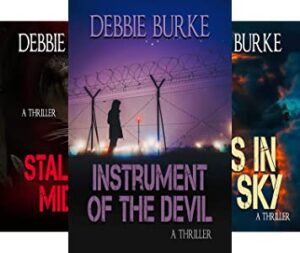
Janet Skeslien Charles
Photo credit: Eddie Charles
by Debbie Burke
@burke_writer
Every time I think I must know or have heard of every Montana author, I meet a new one. This summer, I had the pleasure of attending a talk by Paris-based author Janet Skeslien Charles, who wrote the international bestseller The Paris Library, and her new book, Miss Morgan’s Book Brigade.
Turns out Janet grew up in the little town of Shelby, Montana, population 3200+.
The streets of Shelby must have seemed empty the day of her talk because a number of residents made the three-plus hour trip to Kalispell to see her.
They’re understandably proud of their hometown author who is probably Shelby’s biggest sensation since the heavyweight boxing championship there in 1923 between Jack Dempsey and Tommy Gibbons.
Janet and her charming French husband Eddie live in Paris where she immerses herself in history and culture from World War I and II when her books are set. She visits cemeteries where the dead from those wars are buried. Her meticulous research was evident in her slide show with many black and white photos and historic documents from those eras.
Since many TKZers read and write historical fiction, I thought Janet’s insights and experiences would be helpful to learn about and she graciously agreed to be interviewed.
Please welcome Janet to the Zone.
Debbie Burke: Congratulations on the success of your books! Please share how a small-town Montana girl wound up in Paris.
Janet Skeslien Charles: Thank you, Debbie! As you noted, I grew up in a small town near the Canadian border. Glimpses of the outside world came from my neighbor, a war bride from France, as well from my grandmother’s jigsaw puzzles with their images of French castles. Each week, my mother drove my grandmother, who’d never learned to drive, to the grocery store and the library. From these treks, I understood that books were as nourishing as food, and that the library was a window to the world. These influences inspired me to study French in high school and college, then apply for a teaching job in France. I first worked in eastern France, in Mulhouse, then in the suburbs of Paris.

Anne Morgan
DB: Your books are fiction yet are based on real life women who lived in Paris in the early 1900s, notably Anne Morgan, daughter of millionaire banker J.P. Morgan, and Jessie Carson, a NYC librarian. How did you learn about them and their humanitarian missions?
JSC: In 2010, while researching Dorothy Reeder, the librarian who stood up to the Nazis during World War II in The Paris Library, I discovered that during the Great War, an American librarian named Jessie “Kit” Carson traveled to France, where she created something that did not yet exist here – children’s libraries. After the war, she transformed ambulances into bookmobiles. I’d lived in France for over a decade and had never heard of Carson or the organization that hired her – the American Committee for Devastated France. (In French, the group was called Le Comité américain pour les régions dévastées, or CARD. Members called themselves Cards.) Several Cards received the War Cross medal for courage under fire. I knew I had to write the story.
In 2019, I traveled to the Morgan Library and the New York Public Library to learn more about Anne Morgan and Jessie Carson. There is a lot of information about Anne Morgan, but very little about Jessie Carson. Luckily, the Cards wrote many letters and kept journals, so was able to find more material about Carson.
DB: Why do you think your books resonate so much with readers?
JSC: My readers love libraries and know how important reading is to people of all ages. They enjoy learning about women’s war efforts that sadly have been left out of history books. Jessie Carson was a children’s librarian who changed the literary landscape of France by creating libraries with open stacks and children’s sections. She also paved the way for a library school to train the first French female librarians. Yet both in France and the US, she is unknown. I hope that my readers and I will change that.
DB: Please describe some of your research. How did you blend actual history with the fictional tale?
JSC: I read books about World War I and memoirs by volunteers such as Mary Breckinridge, who went on to create the first comprehensive healthcare system in America. Breckinridge also wrote letters home, and described the situation and her surroundings very well. I read works by French civilians who described the brutal occupation of German soldiers. (Before reaching this book, I had no idea that northern France had been occupied during World War I. According to a CARD report, French children had “skin disease due to malnutrition or practical starvation… and curvature of the spine due to the fact that the Germans made them work in the fields and abandoned trenches.” ) Correspondence between Anne Morgan and her longtime love, Anne Murray Dike, helped me understand the Cards’ personalities.
Bombs destroyed schools and homes. Of course, at that time, there was no radio or television. Books were really the only form of entertainment. So Jessie Carson’s libraries were vital to the community. These children needed to learn how to laugh and play. They needed the enjoyment and escape that only reading could bring. Photos of the children through the years show a progression as they gained weight and learned how to smile again.
Reading the letters and memoirs helped me create the vocabulary and personalities of the volunteers. Documents about how women would be good at library work because they could “type reports and dust the books” underlined the challenges and contemptuous attitudes that the women faced. It is hard to describe the process of blending fact and fiction. Though I invented the dialogue, I used the women’s words from their diaries, letters, and memoirs. I had to tighten timelines and could not write about all the amazing Cards. So perhaps fictionalizing is about making these kinds of choices.
DB: When you visited historic sites, which one made the most meaningful impression on you and why?

Bierancourt
Photo provided by Janet Skeslien Charles
JSC: I was very happy to travel to northern France to visit CARD headquarters in Blérancourt. During the war, the chateau was in ruins. Now, it houses the world’s first and only Franco-American museum, with a large exhibit about the Cards. It was humbling to see how this group of 350 women rebuilt this part of France during and after World War I. Many aid groups left right after the war in 1918, but CARD remained to train French teachers, nurses, and librarians before leaving in 1924. This is the centennial of the Cards handing over the reins to Frenchwomen.
DB: Do you have favorite tips for writers doing historical research?
JSC: Don’t be afraid to pick up the phone and call people. I called every Breckinridge on the East Coast in order to find the descendants of Mary Breckinridge. We are so lucky to live in an age where information is digitized. The CARD reports were all available on line, as were Anne Morgan’s letters to her mother. It is easy to contact museums, historical societies, and libraries to get the information you need. Don’t wait!
DB: What are you working on now?
JSC: I’m waiting to get the copy editor’s notes on my latest novel, THE PARISIAN CHAPTER. It follows a young woman from Montana who lands a job in the American Library in Paris, where she writes her own Parisian chapter.
Lily Jacobsen and her best friend Mary Louise are determined to establish themselves as artists – Lily, a novelist, and Mary Louise, a painter. They share a tiny sixth-floor walkup and survive on brie and baguette.
When Mary Louise abruptly moves out, Lily feels alone in the City of Light for the first time, and is in need of rent money. As the programs manager, Lily is honored to follow in the footsteps of her French neighbor Odile, who infused her childhood with tales of heroic World War II librarians. Here in the storied halls of the ALP, Lily meets an incredible cast of characters – her favorite author, quirky coworkers, broke students, and high society trustees – each with their own stories… and agendas.
The story will come out as an audiobook and features eleven different voices, offering a panoramic view of a real historic institution, and revisiting characters from both of my novels set in France. Lily’s story is a love letter to the artist’s life, the importance of friendship, and leaving home only to find it again. I can’t wait to share it with readers!
Debbie, thank you again for taking the time to interview me!
~~~
Janet, thanks for taking us on a journey to historic Paris. I love your line, “I understood that books were as nourishing as food, and that the library was a window to the world.”
Website: jskesliencharles.com
Sales links for The Paris Library:
Readers in the US: Amazon | Barnes & Noble | Bookshop | Books A Million | Kindle | Google Play
Readers in Canada: Amazon | Indigo | Kindle | Kobo | Apple
Audio: Audible | Google Play | Amazon | Barnes & Noble
Sales links for Miss Morgan’s Book Brigade:
Amazon | Barnes & Noble | Books A Million | Bookshop | Kindle | Apple | Google Play | Kobo
Audio: Audible | Audiobooks | Barnes & Noble | Google Play | Libro | Spotify | Apple Books
Instagram: jskesliencharles
Substack newsletter: https://jskesliencharles.substack.com/
Facebook: https://www.facebook.com/jskesliencharles
~~~
TKZers: Did Janet’s experiences spark fresh ideas for your own research? When you read historical fiction, what qualities make it come alive for you?
 It’s incredible how a designated workspace triggers the mind. For years, I had an office. As soon as I sat at my desk — headphones on, music cranked — my mind knew to write.
It’s incredible how a designated workspace triggers the mind. For years, I had an office. As soon as I sat at my desk — headphones on, music cranked — my mind knew to write.





















 Have you read Meta’s new terms of service (TOS)? Even if you don’t have an account on Facebook, Instagram, Threads, Messenger, or WhatsApp, you may still be bound by its disgraceful overreach.
Have you read Meta’s new terms of service (TOS)? Even if you don’t have an account on Facebook, Instagram, Threads, Messenger, or WhatsApp, you may still be bound by its disgraceful overreach.






